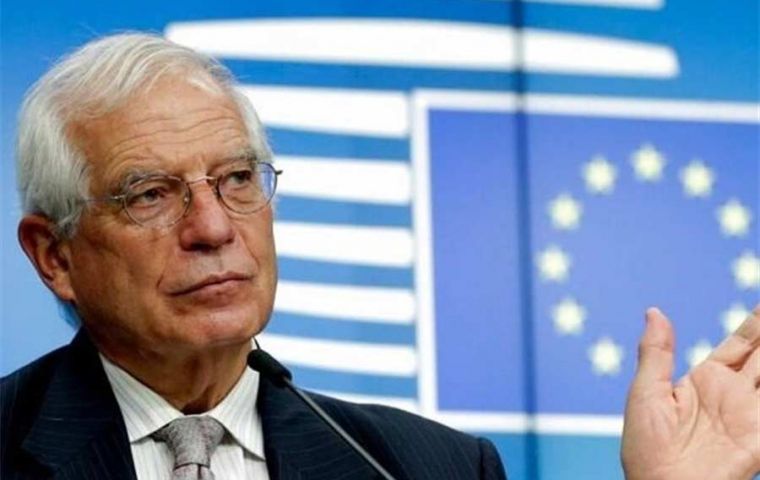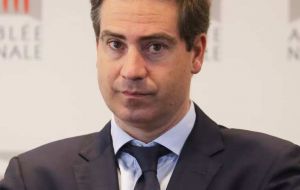MercoPress. South Atlantic News Agency
France still has objections to the EU/ Mercosur trade agreement
 EU foreign affairs Joseph Borrell said EU and Latin American countries have ”a common history and shared values ... but this partnership has been taken for granted or even neglected
EU foreign affairs Joseph Borrell said EU and Latin American countries have ”a common history and shared values ... but this partnership has been taken for granted or even neglected  French Foreign Trade Minister Olivier Becht said that the EU and Mercosur seem keen to “give themselves time” to ratify an agreement on terms that “suit all parties.”
French Foreign Trade Minister Olivier Becht said that the EU and Mercosur seem keen to “give themselves time” to ratify an agreement on terms that “suit all parties.” Ahead of July's EU summit with Latin American and Caribbean leaders in July, the first since 2015, the European Commission has unveiled a trade-oriented strategy to renew ties with a region that has been somewhat sidelined by the bloc in a chaotic few years in global politics. Approving the trade agreement with Mercosur is one of EU's priorities but there is French conditioning.
Though the European Union and the 33 Latin American and Caribbean countries have “common history and shared values ... this partnership has been taken for granted or even neglected,” EU foreign affairs chief Josep Borrell said at a press conference in Brussels on Wednesday.
Trade relations remained strong, but political cooperation has fallen by the wayside, he acknowledged. “Latin America has had its own problems of political fragmentation in the continent,” Borrell said, pointing to the political crisis in Venezuela and the “authoritarian drift” of Nicaragua.
The European Union had been preoccupied by migration and Brexit, he told reporters, but the rise of China and Russia's invasion of Ukraine have re-sharpened the bloc's focus on Latin America.
A senior EU official told reporters that Latin America is like “an old boyfriend or girlfriend that you take for granted and then, when things are getting difficult, you understand how important these people, or these countries, are.”
To help rekindle the flame, the EU executive branch proposes scheduling more regular meetings of heads of state and government, plus a ”permanent coordination mechanism“ between the European Union and the Community of Latin American and Caribbean States.
But one of the strategy's main priorities is wrapping up a trade deal that should slowly phase out 90% of tariffs between the 27 EU member states and the Mercosur bloc: Argentina, Brazil, Paraguay and Uruguay.
”Concluding the EU-Mercosur agreement is a priority for the EU, as this would bring the two regions together in a win-win partnership that creates opportunities for further growth, supports jobs and boosts sustainable development,“ the European Commission wrote in a proposal to member states and the European Parliament.
Negotiations for the massive agreement were finished in 2019 after 20 years of talks, but the text is yet to be ratified because of environmental concerns.
In Brazil this week, French Foreign Trade Minister Olivier Becht said that both the European Union and Mercosur seem keen to ”give themselves time“ to ratify an agreement on terms that ”suit all parties.“ But Becht noted ”France's demands that the Paris Agreement be included as an essential clause, that deforestation be dealt with, that the mirror clauses on French health and environmental standards be respected, and that penalties be imposed if any of this is not applied.“
With deforestation in the Amazon rain forest rife under Brazil's previous president, Jair Bolsonaro, the European Union effectively sat on its hands. But the return to office in late 2022 of President Lula da Silva, who is also eager to finalize the deal, has reawakened hopes that the pact could be pushed through.
The deal, which would likely lead to a massive increase in South American beef imports into the European Union, was unpopular with farmers in France and Ireland, as well as environmental groups such Greenpeace. Mercosur countries also have some concerns.
With Spain, the former colonial power for much of Latin America, taking over the rotating EU presidency in July, supporters hope that the deal will gather momentum. Madrid continues to have close ties with the region.
On Wednesday, the European Commission also highlighted the need to finalize an agreement with Chile, wrap up a deal with Mexico, and have members states ratify agreements with Colombia, Peru and Ecuador.
Likewise EU diplomats have expressed concern about what they see as lackluster support for Ukraine as it battles Russia. As the president of Latin America's largest country, Lula ruffled feathers in the European Union with recent comments implying that Russia and Ukraine share responsibility for the war's continuation because neither has sought to negotiate a peace agreement.
Borrell sought to downplay these concerns on Wednesday. ”On this specific case of Ukraine, there have been some countries which have expressed points of view which don't always tally with what we think,” Borrell said. He pointed to the voting record of Latin American governments at the United Nations, where there has been strong condemnation of Russia's invasion.
Hernan Saenz Cortes, the lead on EU-Latin America advocacy for the anti-poverty NGO Oxfam, said that the European Union's single-track focus on trade risks failing to address burgeoning inequality in the region.
According to an analysis from Oxfam, “in the last three years, the top 1% has accumulated 21% of the wealth created, while we have 60%, six out of 10 people in Latin America, in a situation of vulnerability, mainly women and the Afro and indigenous population,” Saenz said.
Instead of just trying to compete with rising regional presence China for key investment areas such as lithium, for which Latin America produces 60% of the global supply, the European Union should ask itself how it can provide something different, Saenz said.
Possibilities for that, he added, included by supporting civil society or backing progressive debt policies in multinational fora. “If the EU really wants to deepen the relationship with Latin America, they have to place inequalities at the core of this agenda,” Saenz said.




Top Comments
Disclaimer & comment rulesCommenting for this story is now closed.
If you have a Facebook account, become a fan and comment on our Facebook Page!